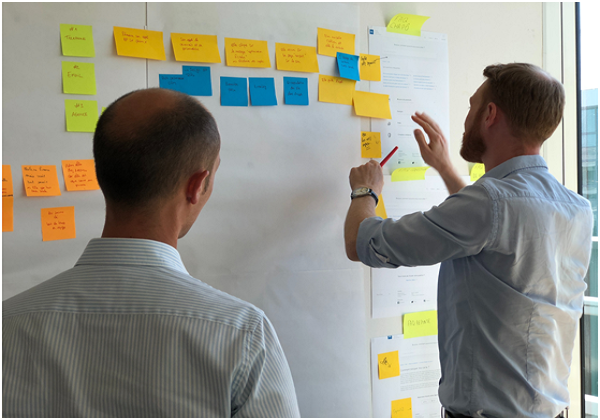Although they often collaborate closely on the same projects, product managers and project managers typically handle 2 separate areas of work. While the product manager establishes the vision for the product that has to be produced, collects requirements, and prioritizes them, the project manager works on this same vision and ensures that it is completed on time and within budget. Certainly similar responsibilities, but also different at the same time.
Project managers guide projects to completion, while product managers are responsible for a product's accomplishment from the start to the end of its lifespan. One can pursue the product management course online or offline and start a successful career in it or begin your journey as a project manager with courses in similar disciplines.
Let's start with the definitions of the terms project and product to better understand the differences:
● A product may be anything that serves the demands of a set of people, whether a physical item, software, or a service. It undergoes a life cycle in which it is created, released into the market, accepted until it reaches maturity, and then retired when it is no longer required.
● A project is a one-off operation with the goal of producing a product or service. It has a predefined result and a starting and completion date. Preparation, strategy, implementation, control activities, and completion are the typical five stages.
Now, let’s understand the functions of both in detail:
Responsibilities of product managers
● From the start of its lifecycle to the end, a product manager is in charge of the product. This implies that they define a product's concept, oversee any changes, and ensure that the product continues to meet consumer expectations until it is discontinued. Product management, in contrast to project management, often lacks a specified start and finish. Product managers can take on high-level tasks like leading a team in bigger companies. A product manager could do more practical tasks in smaller companies, such as market research or even project management.
● The duties of a product manager might vary greatly from team to team and from organization to organization since the position is still relatively new. However, a product manager often performs tasks like defining critical measures for product success, identifying customer requirements, developing product strategy, using market research, and monitoring the performance of the product.
Responsibilities of project managers
● A project manager supervises operations from start to end. A project is a collection of activities intended to meet a single objective. A new bridge's construction is an example of a large project. A minor project can include introducing a new tool to a team. In order to successfully finish each project, a project manager forms teams, establishes timelines, controls budgets, and interacts with stakeholders. Typically, a project has a beginning and an end that are both well defined.
●Responsibilities handled by project managers include establishing important benchmarks such as project scope, schedule, and cost projections, collaboration and communication with the stakeholders, establishing and managing procedures for the project's adjustments, monitoring work according to the timeline, and making sure the project is proceeding effectively and on time.
The major differences between project management and a product manager and how they collaborate:
A project manager is more concerned with the whole lifecycle of a team and project, from development until execution and delivery, while a product manager is often more focused on the unique design and development of a single product. Project managers are in charge of the logistics and implementation of the development plans, while product managers are responsible for driving product development. Naturally, there are some similarities between the two roles even if there are big differences between them.
Both product and project managers are focused on the customer experience, team member management, and how to create the best final product with the available resources. Both positions demand a thorough understanding of the relevant market as well as strong communication and organizational skills.
The success of a project or a product relies on the management understanding their responsibilities and effectively employing their talents to carry them out. If you believe you would be a good fit for any of these positions start pursuing a career in one of them.


No comments:
Post a Comment